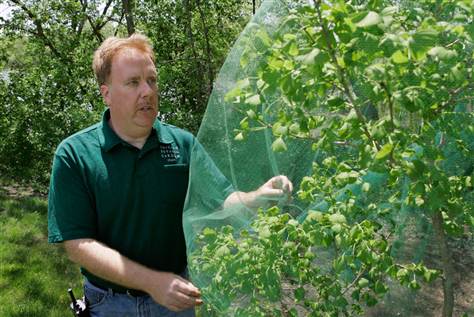The seventeen year mating cycle of the cicada’s is almost done. Although it was very noisy, if you wrapped your trees you probably haven’t experienced much damage. Here is a link to an interesting about cicadas from Science.

Tom Tiddens, an arborist at the Chicago Botanic Garden, stands next to a small tree covered with tulle. Tiddens recommends covering small or young trees with netting to protect them from damage caused by egg-laying cicadas.
(AP Photo/Charles Rex Arbogast)
If you didn’t wrap your trees you are starting to see some “flagging” of the tress leaves. Cicadas lay their eggs under the bark and into smaller tree branches. These branches usually are 1/4″ to 1/2″ in diameter. The resulting damage, called “flagging,” is caused by death of the end of the branch. Damage from cicadas is largely cosmetic. Smaller branches start to lose their leaves and die. Each female Cicada may lay up to four hundred eggs. Sometimes this can disfigure a tree.
When the branches turn brown trim off the deawood. Do not leave the trimmed branches on the ground. It is important to remove the deadwood from your property because in six to ten weeks the cicada eggs will hatch and the larva will drop into the ground where they will burrow 18” to 24” into the soil at the base of the tree.
Now that summer is in full swing. It is important for the tree not to experience any additional stress.
Fall fertilization encourages new leaf growth in the spring. Additional fertilizer in the fall will aid in the recovery of the affected trees.
If your tree experienced an asymmetrically attack by the cicadas you may find that the tree looks lopsided. During the dormant season, prune back the smaller tree branches to round out the tree and restore the tree’s natural shape.
In structural pruning dominant leader branches are maintained by removing smaller branches. Selecting leader branches and removing smaller less attractive branches, suppresses competing leader branches. The goal is to create a rounded, well-shape tree.
Click here for more information
Reference – http://www.urbantree.org/Structuralpruning.shtml
The Urban Tree Foundation provides services and programs to benefit the urban forest. Founded in 1999, UTF is dedicated to promoting and preserving the urban forest through education, planting and tree care. In collaboration with public and private agencies, UTF assists communities in becoming active partners in the planting and maintenance of the urban forest. The Visalia based Urban Tree Foundation is a 501(c)(3) non-profit organization responsible for raising all funds for its community programs.